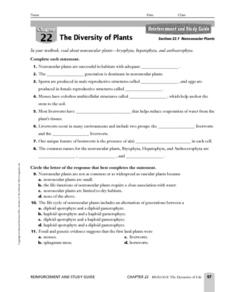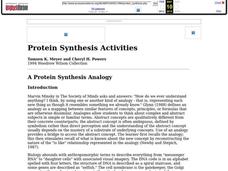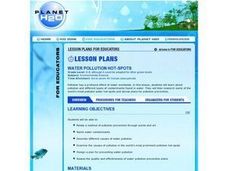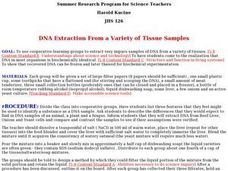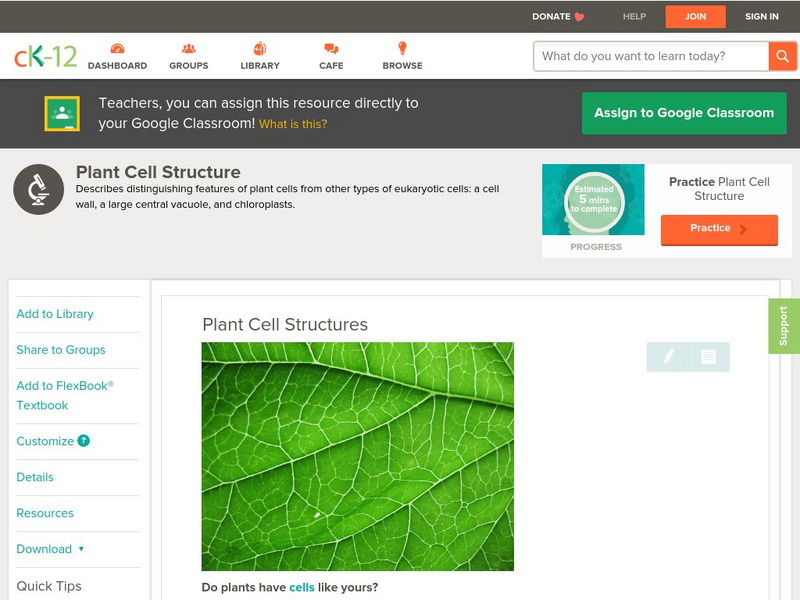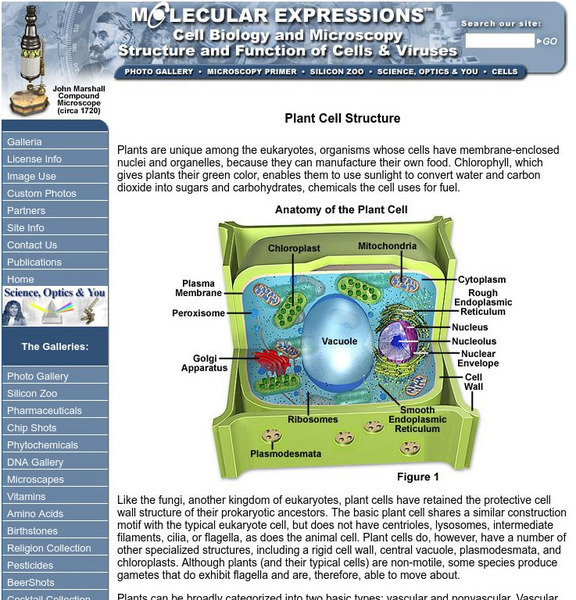Curated OER
Nonvascular Plants
In this nonvascular plant worksheet, students compare the characteristics of bryophyta, hepatophyta, and anthocerophyta. This worksheet has 8 fill in the blank and 3 multiple choice questions.
Curated OER
Understanding Dialect as Used by Mark Twain
A reading of Mark Twain’s The Celebrated Jumping Frog of Calaveras County not only offers pupils an opportunity to practice their listening skills but also provides them with examples of dialectic speech. This is the gol’derndest...
Curated OER
The Bottom Line
Seventh graders assume the role of stockholders in a fictitious biotech company. After investigating the cloning of pets, the effects of cloning on the health and well being of the cloned animal, and the ethical issues involved, groups...
Community Resources for Science
A Whole New World of DNA and Proteins
Lead your young scientists into an exciting world as they participate in a role play and experiment focused on proteins and DNA. After researching the Central Dogma of Biology, individuals or groups participate in a classroom slide...
Curated OER
Lipids: Fats and Oils
A fantastic presentation with great images should improve student understanding of lipids and their involvement in the body. The chemistry of different fats, phospholipids, and steroids are explained. Additionally, the specific uses,...
Curated OER
Light Microscopes
Seventh graders study the parts of a light microscope, and its proper use. They identify each part and explain why it is important to know how to use this tool. They practice observing newsprint on a wet mount slide.
Curated OER
Protein Synthesis Activities
Students participate in a teacher-guided activity to teach about protein synthesis. Student roles include one person as the DNA molecule, another is a single stranded sequence of complementary mRNA.
Curated OER
Can Photosynthesis Occur at Saturn?
Students identify the different requirements for photosynthesis to take place. In this space science lesson plan, students simulate conditions in Saturn to investigate if photosynthesis is possible there. They use data and observations...
Curated OER
Virus Tracker
Sixth graders will simulate the spread of a virus such as HIV through a population by "sharing" (but not drinking) the water in a plastic cup with several classmates. Although invisible, the water in a few of the cups will already be...
Curated OER
Feedback and Flowcharts
Sixth graders explain what a negative feedback system is and they distinguish it from a positive feedback system. They describe examples of how negative feedback is used in both nature and technology. , Students define homeostasis, and...
Curated OER
Genetics
Learners explain the difference between dominant and recessive genes, identify what causes differences in the traits of parents and their offspring, and explain how sex is determined. They will also improve their reading and...
Curated OER
Protein Synthesis Activities
Students compare the process of protein synthesis in an analogy. They simulate the process of protein synthesis kinesthetically using index cards and write a paragraph to explain the process.
Curated OER
Collecting Plankton
In this science worksheet, students learn facts about plankton by reading two pages of factual information. Students read about the different kinds of plankton and how it is classified. Detailed drawings are included. There are no...
Curated OER
Water Pollution Hot-Spots
Students complete internet research in small groups to identify types of water pollution, spotlight water pollution hot-spots, and design a plan for water prevention.
Curated OER
The Long Road to Coffee
Students organize picture cards of the sequene of how food gets from a farm to their home. They then sequence cards of how coffee grown in Colombia gets to their home comparing the differences.
Curated OER
Kingdom Protista Crossword
In this crossword puzzle worksheet, 7th graders read the definitions that relate to the protista kingdom and then complete the crossword puzzle.
Curated OER
DNA Extraction From a Variety of Tissue Samples
Students, working in cooperative groups, extract very impure samples of DNA from a number of tissue samples. They determine how the samples can be preserved and how they are similar.
CK-12 Foundation
Ck 12: Life Science: Plant Cell Structures
[Free Registration/Login may be required to access all resource tools.] Even though plants and animals are both eukaryotes, plant cells differ in some ways from animal cells. Plant cells have a large central vacuole, are surrounded by a...
CK-12 Foundation
Ck 12: Plant Cell Structures
[Free Registration/Login may be required to access all resource tools.] Exercise provides an overview of special structures found in plant cells. It explains the function of the cell wall, explores the role of the central vacuole, and...
BiologyWise
Biology Wise: Plant Cell Structure and Parts
Describes plant cells and the structure and function of their different parts.
Florida State University
Florida State University: Plant Cell Structure
This site features a clear picture of the plant cell with a concise explanation of its key parts and their functions.
Texas Instruments
Texas Instruments: Cell Structure/function
This StudyCards stack enables students to review information about the organelles of eukaryotic plant cell. They are tested on their ability to describe the structure, location, and function of different cell organelles.
BiologyWise
Biology Wise: Basic Unit of Life: Plant Cell Structure and Functions
Describes the three types of plant cells and their differences, and the structures within a plant cell and their functions.
University of Missouri
Oklahoma State University Biotech Adventure: Plant Cell
Follow this link to a clearly labeled diagram of a plant cell. Includes written descriptions of all the parts of the cell.


